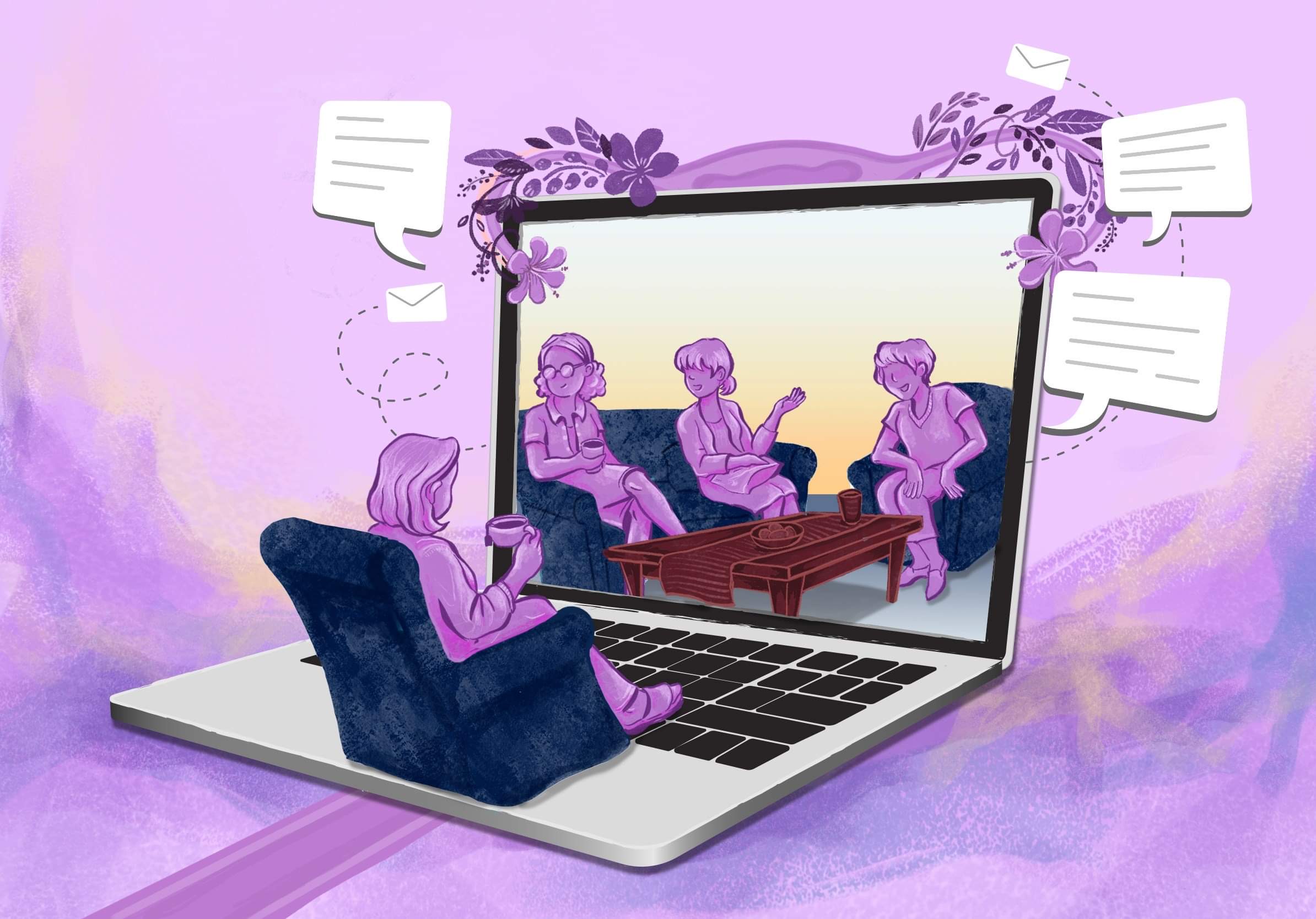
Research Group Digital Mental Health
Project 1: Digital Health Interventions for Women in Menopause
Professor Rhonda W ilson (Australia) and Dr Camille Cronin (United Kingdom) are leading an international research consortium that is developing digital health interventions to support the self-determination of health, well-being and quality of life for women throughout the normal life stages of perimenopause and menopause.
ilson (Australia) and Dr Camille Cronin (United Kingdom) are leading an international research consortium that is developing digital health interventions to support the self-determination of health, well-being and quality of life for women throughout the normal life stages of perimenopause and menopause.
Menopause, like menstruation, is a little-discussed topic, even though it affects half the population.
Symptoms generally appear from age 45 onwards and can last more than ten years. To varying degrees, women going through menopause may experience hot flushes, night sweats, vaginal dryness and discomfort during sex, difficulty sleeping, low mood and/or anxiety, reduced sex drive, problems with memory or concentration, headaches, palpitations, joint stiffness, aches and pains, reduced muscle mass, recurrent urinary tract infections and increased risk of developing osteoporosis.
These uncomfortable, or in some cases, debilitating, aspects of the menopausal life-phase are a concern for workforce populations dominated by women, particularly if these women decide to self-manage their discomfort or distress by reducing their work hours or retiring early.
The first stage of our international research study is focusing on one female-dominated workforce – nursing. In six different countries on both sides of the world, we are investigating registered nurses’ experiences of menopause and how it impacts their professional lives. We also want to know what kinds of support they want and whether digital health therapies or strategies would be useful.
The study is being conducted in the United Kingdom, Finland, Denmark, New Zealand, Australia and the United States of America, using focus groups to explore the experiences of working nurses and to gather their ideas about what kinds of digital health resources would best suit their needs.
Research team
- Professor Rhonda Wilson (University of Newcastle, Australia)
- Dr Camille Cronin (University of Essex, UK)
- Professor Marja Kaunonen (Tampere University, Finland)
- Dr Kerri-Ann Hughes (Massey University, New Zealand)
- Dr Sara Donevant (University of South Carolina, USA)
- Dr Janene Carey (University of Newcastle, Australia)
- Gemma Bidwell (University of Essex, UK)
- Dr Jette Marcussen (University of Southern Denmark)

More information on Professor Rhonda Wilson
 Dr Camille Cronin is a Senior Lecturer and Director of Research and Impact at the School of Health and Social Care, University of Essex. Her research interests include lifelong learning, workplace learning and workforce issues including retention and skill mix, dementia and culture in the healthcare workforce, mouthcare in acute hospitals, socialisation of student nurses in dementia care, pedagogy and curriculum, women’s health and digital health and qualitative methodologies, particularly case study research, ethnography and narrative research.
Dr Camille Cronin is a Senior Lecturer and Director of Research and Impact at the School of Health and Social Care, University of Essex. Her research interests include lifelong learning, workplace learning and workforce issues including retention and skill mix, dementia and culture in the healthcare workforce, mouthcare in acute hospitals, socialisation of student nurses in dementia care, pedagogy and curriculum, women’s health and digital health and qualitative methodologies, particularly case study research, ethnography and narrative research.
More information on Dr Camille Cronin
 Professor Marja Kaunonen is Professor in the Faculty of Social Sciences, Health Sciences at Tampere University in Finland. Marja is the current president of the ENTER Network: European Network on Training, Education and Research in Mental Health. Marja’s research portfolio includes research with families in challenging life situations, such as mental illness, cancer or death of a family member as well as birth of a new baby, and support in challenging life situations. She has around 200 peer reviewed scientific publications.
Professor Marja Kaunonen is Professor in the Faculty of Social Sciences, Health Sciences at Tampere University in Finland. Marja is the current president of the ENTER Network: European Network on Training, Education and Research in Mental Health. Marja’s research portfolio includes research with families in challenging life situations, such as mental illness, cancer or death of a family member as well as birth of a new baby, and support in challenging life situations. She has around 200 peer reviewed scientific publications.
More information on Professor Marja Kaunonen
 Dr Kerri-Ann Hughes is a Lecturer in the School of Nursing at Massey University, New Zealand. Her PhD used case study to explore the positional relationship of senior nursing leadership and the chief executive officers across the New Zealand public health setting. Kerri-ann teaches across undergraduate and postgraduate nursing programs in leadership and has also taught across both Nursing and Management Schools at Massey. She is interested in nursing and health leadership, ethical leadership and women’s health and is a current member of the Massey University Ethics Health Committee.
Dr Kerri-Ann Hughes is a Lecturer in the School of Nursing at Massey University, New Zealand. Her PhD used case study to explore the positional relationship of senior nursing leadership and the chief executive officers across the New Zealand public health setting. Kerri-ann teaches across undergraduate and postgraduate nursing programs in leadership and has also taught across both Nursing and Management Schools at Massey. She is interested in nursing and health leadership, ethical leadership and women’s health and is a current member of the Massey University Ethics Health Committee.
More information on Dr Kerry-Ann Hughes
 Dr Sara Donevant is an Assistant Professor in the College of Nursing at the University of South Carolina. A former ICU nurse, she developed an interest in mobile health applications (mHealth apps) while helping patients manage their chronic conditions. Dr Donevant has a master’s degree in Nursing Informatics and a PhD in Nursing Science. She has been involved in the development of several mHealth apps and has extensive knowledge of features that promote positive patient improvements.
Dr Sara Donevant is an Assistant Professor in the College of Nursing at the University of South Carolina. A former ICU nurse, she developed an interest in mobile health applications (mHealth apps) while helping patients manage their chronic conditions. Dr Donevant has a master’s degree in Nursing Informatics and a PhD in Nursing Science. She has been involved in the development of several mHealth apps and has extensive knowledge of features that promote positive patient improvements.
More information on Dr Sara Donevant
 Dr Janene Carey is a research associate with skills in interviewing, writing and editing. Her PhD used narrative inquiry to explore how family carers cope with the challenge of caring for a dying loved one at home. She has been employed as a research assistant on a diverse range of projects, including LGBTI ageing, nurse practitioners in aged care, bilingualism in the bush and out-of-field teaching.
Dr Janene Carey is a research associate with skills in interviewing, writing and editing. Her PhD used narrative inquiry to explore how family carers cope with the challenge of caring for a dying loved one at home. She has been employed as a research assistant on a diverse range of projects, including LGBTI ageing, nurse practitioners in aged care, bilingualism in the bush and out-of-field teaching.
More information on Dr Janene Carey
Gemma Bidwell is a research assistant and Practice Educator at the School of Health and Social Care, University of Essex. Her research interests include women and child health.
More information on Gemma Bidwell
 Dr Jette Marcussen is employed as a postdoctoral researcher at “OPEN - Open Patient data Explorative Network”, the Department of Clinical Research, University of Southern Denmark. She is also in a shared position as researcher at Health Sciences Research Centre and Senior Lecturer at the Professional Bachelor degree programme of Nursing, University College Lillebaelt, Odense. Her research area is Loss and Bereavement, with a particular focus on promoting mental health, well-being and equality in health in different kinds of family structures experiencing critical illness and/or death.
Dr Jette Marcussen is employed as a postdoctoral researcher at “OPEN - Open Patient data Explorative Network”, the Department of Clinical Research, University of Southern Denmark. She is also in a shared position as researcher at Health Sciences Research Centre and Senior Lecturer at the Professional Bachelor degree programme of Nursing, University College Lillebaelt, Odense. Her research area is Loss and Bereavement, with a particular focus on promoting mental health, well-being and equality in health in different kinds of family structures experiencing critical illness and/or death.
More information on Dr Jette Marcussen
Project publications
Cronin, C., Hungerford, C., & Wilson, R. L. (2020). Using Digital Health Technologies to Manage the Psychosocial Symptoms of Menopause in the Workplace: A Narrative Literature Review. Issues in Mental Health Nursing 1-8. doi:10.1080/01612840.2020.1827101
- Many women experience vasomotor, psychosocial, physical and sexual symptoms during their menopausal life-stage. Specifically, the psychosocial symptoms of menopause can include loss of confidence, issues with self-identity and body image, inattention and loss of memory, increased levels of stress, and a higher risk of developing anxiety and depression. In the workplace, such symptoms can impact the woman's capacity to perform to her optimal levels. Even so, many women do not seek help to manage their symptoms due to feelings of embarrassment, the possibility of experiencing adverse reactions from others, or the cultural taboos that are attached to the condition. Digital health technologies, including virtual consultations, therapeutic interventions, and participation in online communities of support, provide an important means by which women can obtain information about menopause. In the field of mental health, digital technologies have an increasing evidence base. This paper considers how mental health practitioners can adapt, utilise or recommend digital health strategies to support older women in occupational settings to manage their psychosocial symptoms of menopause.
- Working through menopause with e-help Newsletter 1 - October 2020 (PDF, 679.5 KB)
- Working through menopause with e-help Newsletter 2 – December 2020 (PDF, 484.9 KB)
- Working through menopause with e-help Newsletter 3 – March 2021 (PDF, 788.6 KB)
- Working through menopause with e-help Newsletter 4 – June 2021 (PDF, 1.6 MB)
- Working through menopause with e-help Newsletter 5 – Oct 2021 (PDF, 504.2 KB)
The University of Newcastle acknowledges the traditional custodians of the lands within our footprint areas: Awabakal, Darkinjung, Biripai, Worimi, Wonnarua, and Eora Nations. We also pay respect to the wisdom of our Elders past and present.
